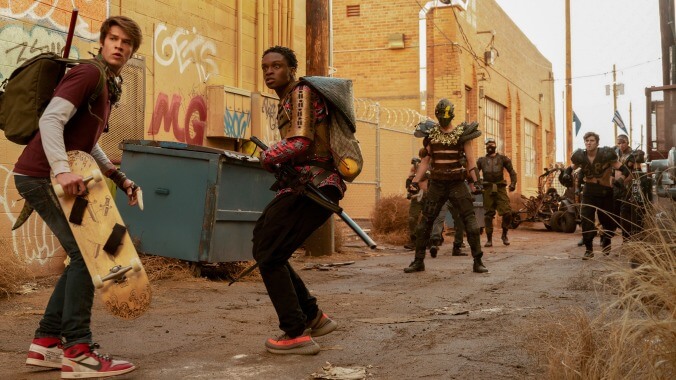Brad Peyton and Aron Eli Coleite’s take on the material reflects its source only in title and a lightly gruesome nod to the main character. Deviating from Ralph’s Daybreak is not necessarily a bad thing—the graphic novel doesn’t exactly scream, “Turn me into riveting television.” This blank-slate approach to adaptation could double as a challenge to improve on old works by producing something fresh, but Peyton and Coleite’s vision is a hokey, desperately snarky zombie tale that churns out an entirely new crop of characters, only to center on the least interesting of the bunch.
The series opts for a completely different premise: Mapping adolescent social hierarchy—terrifying in its own right—onto civilization’s collapse. An atom bomb triggers an epidemic that has somehow only affected the adults, leaving the students of Glendale High School alone to rebuild society on their own terms. While the majority of the surviving youth remains beholden to their cliques, Josh Wheeler (Colin Ford) is on a solo quest to find his maybe-girlfriend, Sam Dean (Sophie Simnett). Before long, he’s reluctantly saddled with two loyal companions: a foul-mouthed 10-year-old genius named Angelica Green (Alyvia Lind) and Wesley Fists (Austin Crute), a former jock-turned-faux samurai on a quest for redemption. Add a dash of Mad Max and some old fashioned zombie (or “ghoulie,” in Daybreak parlance) slaying, and all the building blocks for an enthralling story are there. In theory.
But to its detriment, Daybreak exhausts its energy attempting to convince the audience that Josh—a perfectly affable guy made distinguishable only by a cluster of ham-fisted Ferris Bueller references and some seriously contrived, fourth wall-obliterating dialogue—has a story worth following. His arc largely hangs on this quest to find Sam, without delving into their connection beyond a handful of pleasant interactions and straining his motives to risk life and literal limb for her. The audience is granted some reprieve whenever the spotlight shines on Angelica or Wesley, the perspective and style shifting in kind: Crime boss-like voiceovers for the former, indulgent, anime-style narrative for the latter. These pivots add amusing textures while emphasizing Daybreak’s potential beyond its designated lead.
And there is some genuine fun to be had. While we’ve seen schoolyard social groups interpreted as self-contained, highly politicized communities before (Recess, anyone?), fueling the premise with life-or-death stakes and Fury Road-like vigor (and costuming, which is admittedly pretty stellar) energizes Daybreak, making the series sporadically watchable. This is one of the more promising outcomes of straying from the series’ dreary precursor: Daybreak’s silliness, though often heavy-handed, sets it apart from The Walking Dead or Dawn Of The Dead (the latter of which is appropriately signaled when the kids take shelter in a shopping mall). Josh’s assertion that the apocalypse was the best thing to ever happen to him gives an all-too-brief jolt to zombie tropes: This is an opportunity for him—for all the survivors, really—to reset and grow into their own identities without the pressures of imposing, presumably well-meaning adults like Matthew Broderick’s delightful, gentle-to-a-fault Principal Burr.
That sentiment is entirely lost on the rest of the student body, which resorts to murder and varied brutality as means of survival. When they’re not harpooning each other over resources, they’re vehicles for the writer’s confusing jabs at “woke” culture, switching from awareness one moment to extremely lazy potshots the next. (It’s especially jarring from young Angelica, who is brilliant enough to comprehend and voice the harmful context of homophobic and ableist slurs mere seconds before lobbing both at one of the few queer characters in the series.) This desperation to appeal to a young audience while simultaneously showing so little faith in them further muddies any assumptions as to whom, exactly, this story is for.
It would be easy to jettison Daybreak into the realm of forgettable Netflix Originals if not for its fifth episode, which smartly focuses on Wesley’s struggle to evolve in spite of his past. By taking the time to really build a gripping origin story with an accessible conflict, Wesley feels like one of the few wholly realized characters throughout the series. If the remainder of Daybreak follows this trajectory by daring to lean on substantial characters like Wesley, then there may be hope for it yet. But if Peyton and Coleite’s plan is to dwell in the hyper-meta space of half-formed social commentary and only marginally amusing quips, then we’ll just see you at the next apocalypse.


 Keep scrolling for more great stories.
Keep scrolling for more great stories.
